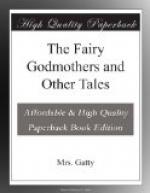Such of my readers as have seen one of those excellent institutions called “blind schools,” will not wonder at any thing I have said, but on the contrary, will know that I have not told half or a quarter of what may be done to teach blind children a variety of employments. At those schools you may see children making beautiful baskets of various-coloured strips of osier arranged in patterns; and they never forget on which side of them the different colours are laid, and this work they can go on with quite fast, even while you stand talking to them—and they learn to do many many other nice things also besides basket making.
Of late years too they have begun to read in books made on purpose for them, with the letters raised above the rest of the paper, so that they can feel the shapes with their fingers. Is not this wonderful? And they can be taught all these things much more easily than you would imagine, for it is really true that when one of the senses has been taken away, the others by having all the exercise thrown upon them, become so sharp and acute, they do twice their usual work, if I may so express it. This is a merciful dispensation of Providence, which renders the loss of the one that is gone much less hard to bear. And does it not teach us also, what a valuable thing constant practice is? Neither you nor I can feel or hear half so clearly as blind people can, who practise feeling and hearing on so many occasions where we save ourselves the trouble, by using sight instead.
To return to Roderick. You perhaps expected to hear that he fretted and petted very much after he was first blind, but really it was not so; and though occasionally he may have grumbled a little, it was only when he was slightly peevish, as children will sometimes be, and I believe he would have found something to grumble about then, even if he had seen as well as you do.




